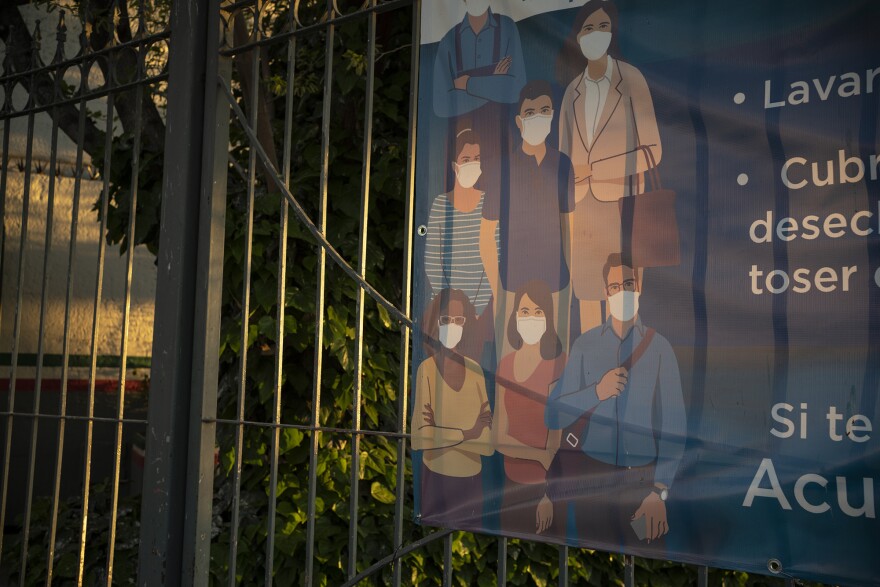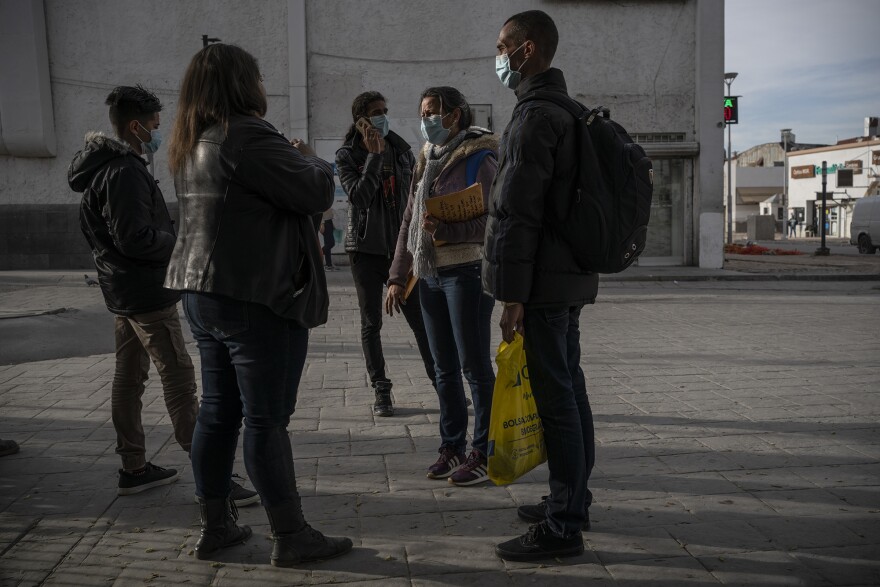It was still dark when Alejandra arrived at the Paso del Norte International Bridge in Juárez, Mexico, around four in the morning. She and her 13-year-old daughter sat near the turnstile and waited for officials to let everyone through.
They had already come to the bridge earlier in the week, to present themselves for U.S. immigration court. But they were told to come back several days later.
"They didn't tell us anything," Alejandra said in Spanish. "They didn't give us a paper to show that we'd been here. They just told us to show up today at the same time."
(Alejandra, like other asylum seekers in this story, asked that we not use her full name while her case is still being considered.)
Tens of thousands of asylum seekers have been sent to wait in Mexico as their cases play out in U.S. immigration court, as part of the Trump administration's Migrant Protection Protocols (MPP) — also known as the "Remain in Mexico" program.
Many are here in Juárez, living in crowded shelters or sharing rooms, often in dilapidated buildings.
Their hearings have now been postponed due to the coronavirus pandemic. Yet they still have to show up at ports of entry on their original court dates, in order to receive new ones — a process that puts them at risk.

"They make us come here without taking any precautions," Alejandra said. "And for nothing, at the end of the day."
Alejandra arrived on a crowded day. People like her, who had court dates during a sort of limbo period before the U.S. government officially postponed hearings, were told to come back, along with people who were scheduled to show up in court today.
More than a hundred people eventually lined up on the Mexican side of the bridge, standing mostly shoulder to shoulder. Some wore masks or wrapped scarves around their noses and mouths, but many went unprotected. A few cradled babies in their arms, wrapped up in warm blankets.
U.S. officials let people through in shifts, to receive paperwork with their new court dates.
A little girl snapped pictures of the sunrise on her mother's phone. It was mostly quiet, except one scary moment when a heavily pregnant woman fainted and was rushed to the front of the line.

Alejandra and her daughter stood patiently, with small backpacks slung over their shoulders.
They came to Juárez from Guatemala seven months ago, and have been renting out a room here. When she can, Alejandra cleans houses to earn a little money.
Now, they're doing whatever they can to protect themselves from the coronavirus: washing their hands, hanging their clothes out to bake in the sun — not a proven method for killing the virus, but their best line of defense.
"We're trying to do everything they recommend, but it's pretty difficult," Alejandra said.
Her son sends updates from Guatemala. That country has ramped up measures to stop the spread of the virus, including by implementing a curfew. In Mexico, it seems like people aren't taking the virus as seriously, Alejandra said.

"The coronavirus is real," her daughter added, as if delivering a public service announcement. "Someone who's sick can infect other people before they know they're sick."
They're worried that could happen today — whether on their Uber ride to the port of entry, standing on the crowded bridge, or interacting with immigration officials.
They're finally waved into the U.S. just before 6 a.m., nearly two hours after they first arrived to receive their new court dates.
The spread of COVID-19 complicates an already difficult situation for asylum seekers waiting in Mexico.
"No one wins," said Leo, a Cuban asylum seeker who has been living in a shelter on the outskirts of Juárez for nearly a year.
If the hearings moved forward, he said, migrants would have had to choose between risking their health to attend court or giving up their cases. Yet postponing hearings means they're stuck in Mexico for even longer — another place their safety is at risk, first because of violent crime and now COVID-19.
Leo said shelter residents are concerned about their health.
"We make an effort so that everything's clean," he said in Spanish. "We always have enough water. But sometimes we can't count on there being cleaning products."

Several residents work in maquiladoras, or factories, Leo said. He worries they might bring coronavirus back to the shelter.
For people like him, who haven't found work, an already dire situation has become even worse.
"The people who were supporting us financially — family and everyone — can't send money anymore like before," Leo said. "They can't help in that way because they've also been laid off from their jobs."
The pandemic exacerbates all the issues with making asylum seekers wait in Mexico, said immigration attorney Taylor Levy. She temporarily moved from El Paso to Juárez, to ensure she could continue working with migrants if the U.S. government imposed travel restrictions.
Levy has been spending most mornings at the international bridge, offering free legal advice to the asylum seekers navigating the situation.
"This process is absolutely ridiculous, but that's because MPP is absolutely ridiculous," Levy said.

She said many people in the program don't have a fixed address; the only way to get in touch with them to provide new court dates and paperwork is to have them come to the bridge — at a time when people around the world are being told to stay home and avoid crowds.
Levy believes asylum seekers should be paroled into the U.S. to quarantine with family.
"None of these shelters would exist if it wasn't for Remain in Mexico," she said. "These shelters are in very bad condition, and a lot of people are going to get sick."
Maria, a 68-year-old asylum seeker from Cuba, hopes she can stave off the virus. She sat outside a government building in Juárez, waiting to renew her Mexican visa — the second step in the process, after receiving her new U.S. court date.
Maria arrived here months ago with her four grandchildren. They eventually crossed the border on their own, after a harrowing experience at a shelter; until recently, children who are unaccompanied by adults were admitted into the U.S.
Maria is glad they're safe and with family, but worried about her own health. She knows she's at a higher risk of getting sick from COVID-19 because of her age, and said she has weak lungs.

"I know I won't live forever, but I don't want to die from coronavirus," she said.
Maria said the violence in Juárez made her scared to go out in public even before the pandemic. Now, she's taking extra precautions.
She showed off her protective gear: a blue face mask and plastic shower cap. She peeled back her fuzzy black gloves to reveal a second layer of latex gloves underneath.
"I only leave [the shelter] when I have to," Maria said. "I only went today to get this paper."
She unzipped a large bag on her lap and pulled out a folder filled with important documents, then held up a sheet of paper with her new court date: April 27.
As it turned out, that date wasn't late enough. Less than a week after Maria received her new documents, the U.S. government announced it's delaying all hearings through May 1.
That means, to get a new court date, Maria will have to suit back up in her shower cap and gloves and go through the same process all over again.








